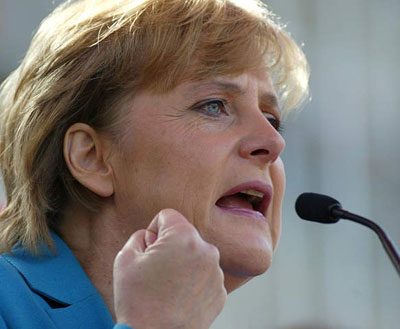Germany's new political partners face daunting "to do" list
 Berlin - Germany's new political partners faced a daunting "to do" list as they entered the final two days of coalition talks on Thursday, with key open issues including tax policy and ministerial appointments.
Berlin - Germany's new political partners faced a daunting "to do" list as they entered the final two days of coalition talks on Thursday, with key open issues including tax policy and ministerial appointments.
Chancellor Angela Merkel's Christian Democrats (CDU) and the Free Democrats (FDP) aim to finalize their new government charter by the weekend and appoint the new coalition next week, after winning a majority in last month's general election.
In the third week of coalition talks between the CDU, their Bavarian Christian Social (CSU) sister party and the FDP, the size and shape of tax cuts remained a key point of contention.
The parties came under fire for plans to brush aside billions of euros of social spending in a "shadow budget," in order to start the new legislature with a purged balance sheet which would enable tax cuts.
The draft proposal - criticized for hiding, not solving Germany's budget problems - would allow the parties to fulfil tax relief promises made before the election, despite Germany's poor state finances.
The fund would swallow up to 60 billion euros (90 billion dollars) of "crisis-induced deficits," including 45 billion euros allocated to the employment ministry, which faces rising unemployment payouts as a result of the economic crisis.
The effect would be to bundle deficits resulting from the previous coalition of CDU and Social Democrats (SPD), enabling the new government to start with a clean bill.
However, the plan could run into constitutional problems over the amount of debt the state can amass. In coming years, regulations are set to become even more stringent over permissible levels of budget deficit.
Tax cuts are to be introduced by 2011 at the latest, according to CSU-leader Horst Seehofer. Both corporate and inheritance tax are to be restructured, and there are plans to increase child benefit.
The FDP wants to introduce tax relief totalling 35 billion euros over the next four years, while the CDU has proposed a more modest 20-billion-euros worth of cuts.
The Greens accused the new coalition of deceiving the electorate by going back on promises to fund tax cuts through government savings, rather than incurring new debts. The SPD's financial expert Joachim Poss said the CDU and FDP were simply trying to save face.
The German economy has begun a sluggish recovery, but still faces an estimated 4.5 per cent contraction in 2009.
In the final stage of coalition talks, expected to last into the early hours of Saturday, Merkel, Seehofer and FDP-leader Guido Westerwelle are also due to finalize the allocation of ministries.
Westerwelle is widely touted for the role of foreign minister. Thomas de Maiziere of the CDU, who currently heads the Chancellor's office, has been proposed for the finance ministry, where he would control the government's purse strings.
Besides taxation, foreign policy and security issues remained on the table. One open question is the future of military conscription in Germany, which the FDP would like to end.
Health policy remained a hot topic, after the FDP demanded structural changes to the unpopular Health Fund, introduced by the outgoing CDU-SPD government to pool health contributions from employers and employees.
The health budget faces a multi-billion-dollar deficit, prompting suggestions of a top-up from the proposed "shadow budget."
CDU, CSU and FDP agreed on proposals to increase employee contributions to an insurance covering care for the elderly.
The parties have also agreed to extend the life of nuclear power stations beyond the year 2020, overturning a previous government decision.
A preliminary draft of the coalition deal obtain by the German Press Agency dpa also addresses the need to securely deposit nuclear waste, following an ongoing debate about proposed sites for nuclear waste in Germany.
The coalition partners have also agreed to place the banking regulatory body, BaFin, under the control of the German central bank, or Bundesbank.
The coalition charter forms a binding document laying out the government's programme for its full four-year legislature.
Merkel has been keen for the new government to be constituted in time for celebrations marking the 20th anniversary of the fall of the Berlin Wall, on November 9.(dpa)